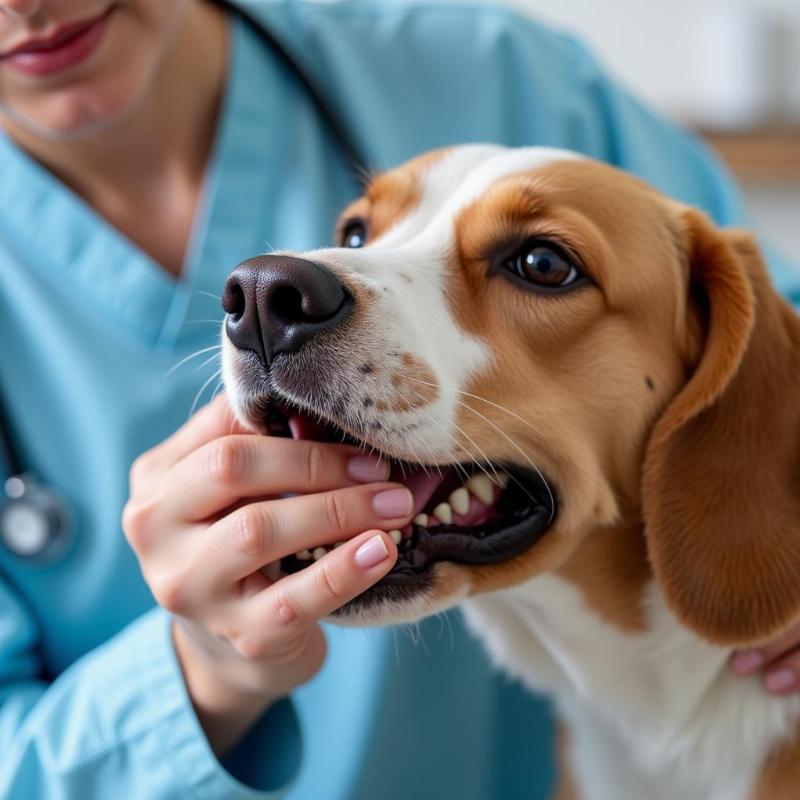Taking care of your dog’s pearly whites is about more than just fresh breath. Regular dental care is a crucial part of overall pet health, impacting everything from their ability to eat comfortably to preventing serious health issues down the road. So, how often do dogs’ teeth actually need to be cleaned? Let’s dive into the details and equip you with the knowledge to keep your furry friend’s smile sparkling and healthy.
The Importance of Regular Dog Teeth Cleaning
Just like humans, dogs can develop plaque and tartar buildup, leading to gingivitis, periodontal disease, and even tooth loss. These dental problems can cause significant pain and discomfort, affecting your dog’s appetite, mood, and overall well-being. Furthermore, bacteria from infected gums can enter the bloodstream and potentially affect other organs, like the heart, kidneys, and liver. Regular cleaning helps prevent these issues, contributing to a longer, healthier life for your beloved companion.
How Often Should You Brush Your Dog’s Teeth?
The gold standard recommended by veterinarians in the US is daily brushing. Think of it like brushing your own teeth – the more frequently you do it, the less plaque and tartar accumulate. While daily brushing is ideal, even a few times a week can make a significant difference in your dog’s oral hygiene.
Professional Dog Teeth Cleaning
While regular at-home brushing is crucial, professional dental cleanings performed by a licensed veterinarian are essential too. These cleanings involve general anesthesia to allow for a thorough examination and cleaning above and below the gum line, removing tartar and plaque that brushing can’t reach. Generally, professional cleanings are recommended annually, but your veterinarian may suggest a different frequency based on your dog’s breed, age, and overall dental health.
 Veterinarian checking dog's teeth
Veterinarian checking dog's teeth
Signs Your Dog Needs a Dental Check-up
Even with regular brushing, it’s essential to be vigilant for signs that your dog may need professional attention. Bad breath, red or swollen gums, excessive drooling, difficulty chewing, or pawing at the mouth are all potential indicators of dental problems. If you notice any of these signs, schedule a check-up with your vet promptly.
Tips for Brushing Your Dog’s Teeth
Introducing teeth brushing to your dog should be a gradual and positive experience. Start by getting them used to having their mouth touched. Gradually introduce a dog-specific toothbrush and toothpaste (never use human toothpaste, as it contains ingredients that are toxic to dogs). Make the experience enjoyable by using positive reinforcement, like praise and treats.
Other Ways to Support Your Dog’s Dental Health
Besides brushing, various other products can contribute to your dog’s oral health. Dental chews, treats, and toys can help scrape away plaque and tartar. Always choose products approved by the Veterinary Oral Health Council (VOHC) to ensure safety and efficacy.
What Happens During a Professional Dog Teeth Cleaning?
During a professional cleaning, your dog will be under general anesthesia. The veterinarian will perform a thorough examination, scaling away plaque and tartar both above and below the gum line. They may also take X-rays to assess the health of the teeth roots and jawbone. Polishing the teeth helps smooth the surface, making it more difficult for plaque and tartar to adhere.
Conclusion
Maintaining your dog’s oral hygiene is a lifelong commitment, and knowing how often to clean their teeth is a vital part of responsible pet ownership. Daily brushing is the ideal goal, supplemented by regular professional cleanings. By prioritizing dental care, you contribute significantly to your dog’s overall health and well-being, ensuring they enjoy a happy, healthy life filled with wagging tails and bright smiles.
FAQ
-
Why is dog dental care so important? Dental disease can lead to pain, infection, and even damage to other organs.
-
Can I use human toothpaste on my dog? Never use human toothpaste on dogs, as it contains ingredients that can be toxic to them.
-
How often should my dog have professional teeth cleaning? Typically, annual cleanings are recommended, but your vet will determine the best frequency for your dog.
-
What are signs of dental problems in dogs? Bad breath, red or swollen gums, difficulty chewing, and excessive drooling are common signs.
-
What happens during a professional dog teeth cleaning? Your dog will be under anesthesia while the vet scales, polishes, and examines their teeth.
-
What can I do at home besides brushing? Dental chews, treats, and toys can help support your dog’s oral health.
-
How can I make teeth brushing easier for my dog? Introduce it gradually and use positive reinforcement to make it a positive experience.
Beautdogs.us is your trusted source for comprehensive and engaging information on all aspects of dog care, breeds, and lifestyle in the US. We cater to both new and experienced dog owners, providing expert advice on everything from nutrition and grooming to training and health. We’re passionate about helping you build a strong, loving bond with your furry companion. For personalized guidance on your dog’s dental health or any other dog-related questions, reach out to our expert team at [email protected] or call us at +1 501-555-7529. Beautdogs.us – Your ultimate guide to a happy, healthy dog.